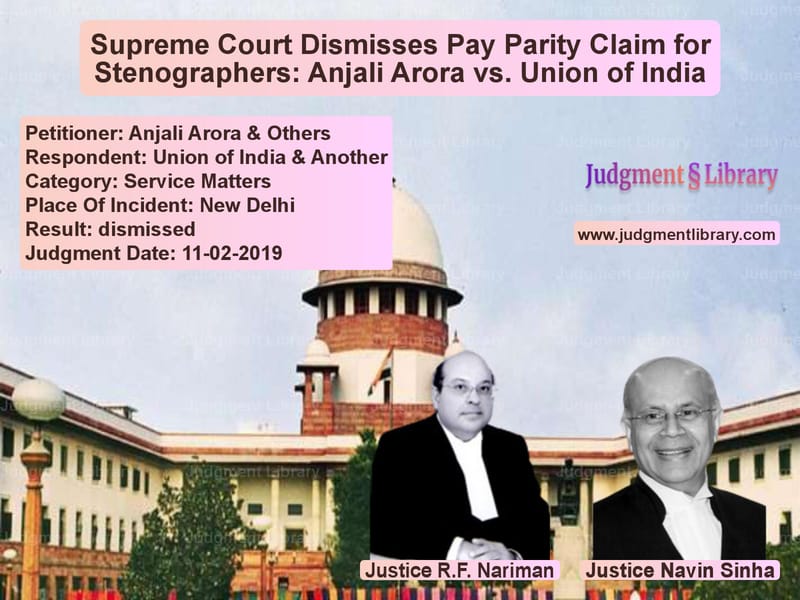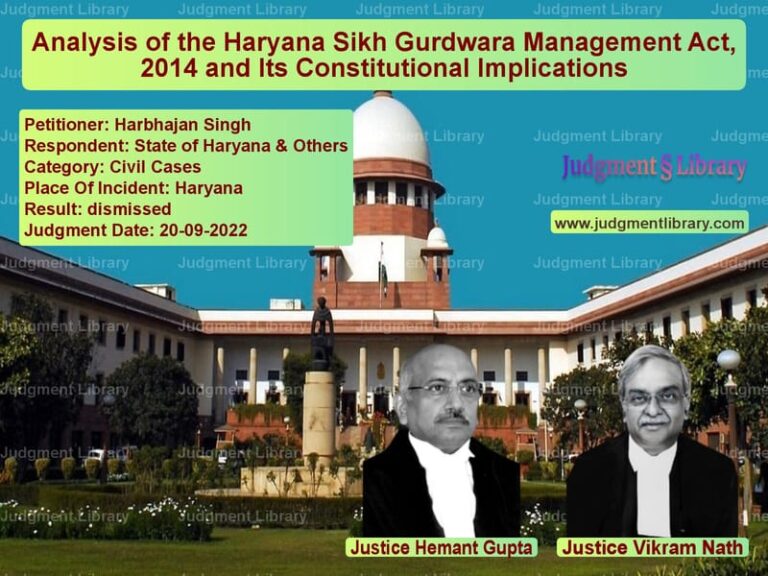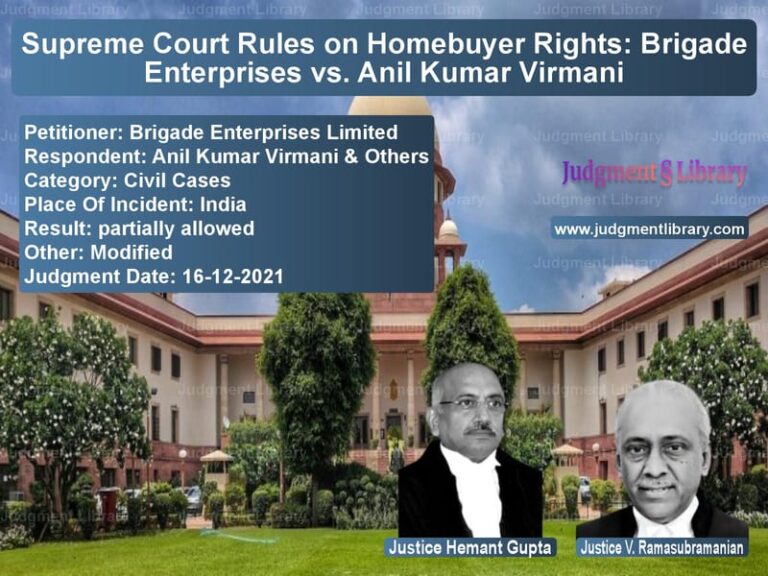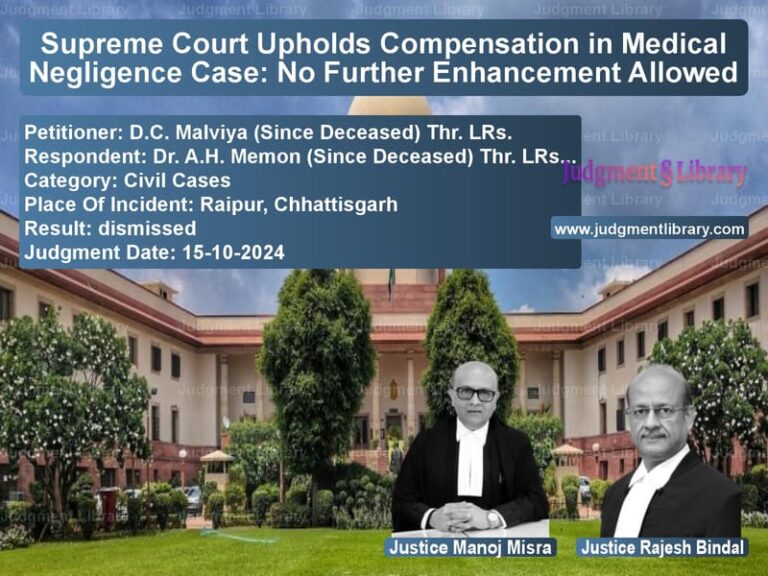Supreme Court Dismisses Pay Parity Claim for Stenographers: Anjali Arora vs. Union of India
The Supreme Court of India, in Anjali Arora & Others vs. Union of India & Another, ruled against a group of stenographers seeking pay parity under Article 32 of the Constitution. The petitioners claimed that they were entitled to the same pay scale as granted to their counterparts in the case of Yogeshwar Prasad & Ors. vs. National Institute of Educational Planning and Administration & Ors., (2010) 14 SCC 323. The Court dismissed the writ petition, holding that the petitioners were not similarly situated as the beneficiaries of the previous ruling.
Background of the Case
The petitioners, comprising stenographers employed at the National Institute of Educational Planning and Administration (NIEPA), sought a writ of mandamus directing the government to grant them the pay scale of Rs. 1640-2900 with effect from January 1, 1986, as recommended by the 4th Central Pay Commission. They argued that:
- They were similarly placed as the appellants in the Yogeshwar Prasad case, where the Supreme Court had granted a higher pay scale to Senior Stenographers.
- Despite making representations since 2015, their claim was only rejected on February 5, 2018.
- The government had extended similar benefits to four other individuals who were not parties to the Yogeshwar Prasad case, amounting to arbitrary and hostile discrimination.
Government’s Defense
The Union of India opposed the claim, arguing that:
- The petitioners were not similarly situated to those in the Yogeshwar Prasad case.
- The petitioners were appointed as Junior Stenographers (Stenographer Grade-II), whereas the beneficiaries in the Yogeshwar Prasad case held higher posts of Senior Stenographer (Stenographer Grade-I).
- Merely acquiring the higher pay scale under the Assured Career Progression (ACP) or Modified Assured Career Progression (MACP) schemes did not entitle them to claim parity with Senior Stenographers.
- The government’s decision to extend benefits to four other individuals was based on specific service records and conditions, not on a general rule applicable to all stenographers.
Supreme Court’s Observations
1. Pay Parity Requires Similarity in Job Role
The Supreme Court reaffirmed that pay parity could only be granted if the employees were similarly situated. It noted:
“Parity of pay scale can be granted to the petitioners provided they were similarly situated as the appellants in the Yogeshwar Prasad case. If that be so, they would undoubtedly be entitled to be considered for similar relief.”
2. Difference in Job Designation and Responsibilities
The Court found that the petitioners had not held the position of Senior Stenographer at the relevant time. The judgment stated:
“The petitioners were appointed as Junior Stenographers (Stenographer Grade-II), which is a post lower than that of Senior Stenographer (Stenographer Grade-I) held by the appellants in Yogeshwar Prasad. The posts carry different pay scales, and merely acquiring ACP/MACP does not entitle the petitioners to the same benefits.”
3. Previous Pay Commissions Did Not Grant the Same Scale
The Court noted that the pay scale of Rs. 1640-2900 for Stenographer ‘C’ (Senior Stenographer, Stenographer Grade-I) was operationalized only in terms of a government order dated July 31, 1990, which was applicable during the 5th Central Pay Commission. The petitioners, however, did not hold the relevant positions at that time.
4. Individual Promotion Timeline Matters
The Court examined the individual service records:
- Petitioner Nos. 1 and 2 were promoted to Stenographer Grade-I only in 2017 and 2018, respectively, when the 6th and 7th Pay Commissions were operational.
- Petitioner No. 3 retired as a Junior Stenographer (Stenographer Grade-II) in 2016 and never held the position of Senior Stenographer.
Based on this, the Court held:
“The petitioners not being similarly situated as the appellants in Yogeshwar Prasad, we find no merit in the present writ petition.”
Final Judgment
The Supreme Court dismissed the writ petition, ruling that:
- The petitioners were not entitled to the pay scale of Rs. 1640-2900 as granted in the Yogeshwar Prasad case.
- The extension of benefits to four individuals by the government did not create a general entitlement for all stenographers.
- The pay scales granted under ACP/MACP were not equivalent to direct promotions to higher posts.
Key Takeaways
- Pay parity requires actual similarity in job role: Employees must have identical job responsibilities and career progression to claim equal pay.
- ACP/MACP does not equate to promotion: Merely reaching a higher pay scale through career progression schemes does not entitle employees to benefits meant for promoted officers.
- Previous court rulings must be interpreted carefully: The Yogeshwar Prasad judgment was specific to the appellants and did not create a general precedent.
- Government discretion in extending benefits: The Court upheld the government’s authority to extend benefits selectively based on service conditions.
Conclusion
The Supreme Court’s ruling in Anjali Arora vs. Union of India clarifies the legal principles surrounding pay parity and career progression. The judgment reinforces that employees cannot claim financial benefits merely because of similar pay scales under ACP/MACP, unless they held comparable job designations. This decision serves as a crucial precedent for future disputes related to service matters and pay parity in government employment.
Petitioner Name: Anjali Arora & Others.Respondent Name: Union of India & Another.Judgment By: Justice R.F. Nariman, Justice Navin Sinha.Place Of Incident: New Delhi.Judgment Date: 11-02-2019.
Don’t miss out on the full details! Download the complete judgment in PDF format below and gain valuable insights instantly!
Download Judgment: Anjali Arora & Other vs Union of India & Ano Supreme Court of India Judgment Dated 11-02-2019.pdf
Direct Downlaod Judgment: Direct downlaod this Judgment
See all petitions in Employment Disputes
See all petitions in Promotion Cases
See all petitions in Public Sector Employees
See all petitions in Judgment by Rohinton Fali Nariman
See all petitions in Judgment by Navin Sinha
See all petitions in dismissed
See all petitions in supreme court of India judgments February 2019
See all petitions in 2019 judgments
See all posts in Service Matters Category
See all allowed petitions in Service Matters Category
See all Dismissed petitions in Service Matters Category
See all partially allowed petitions in Service Matters Category







